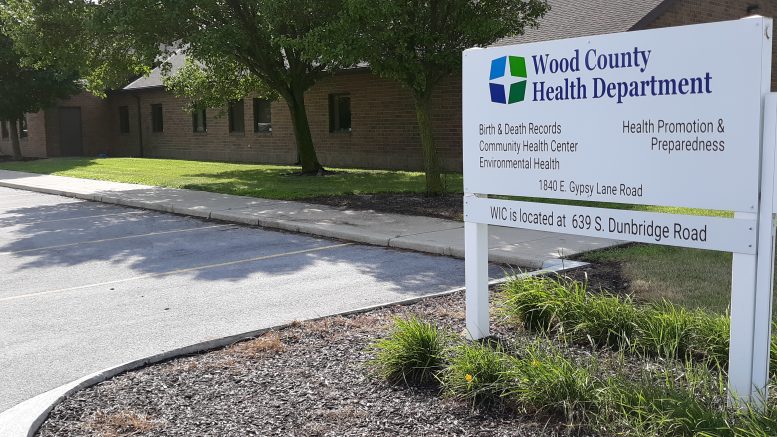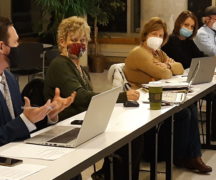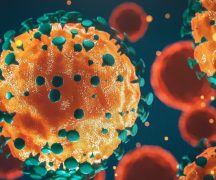Wood County Health Department is monitoring the situation surrounding the 2019 Novel Coronavirus, which has been circulating in China and also surfaced on a limited basis in the United States. While this is of concern to public health, currently the risk to the general public in the United States is low.
At this time, there are a small number of individual cases in the U.S. Zero suspected or confirmed cases have been identified in Wood County. Two possible cases are under investigation in Southern Ohio.
To minimize the risk of spread, health officials including Wood County Health Department are working with medical providers to promptly identify and evaluate any suspected cases. For several weeks, Wood County Health Department has been working with Bowling Green State University, Falcon Health Center, Wood County Hospital and other health care providers to offer guidance, including screening tools to help identify anyone who may have traveled to Wuhan City, China.
“We are watching this very closely and working with our partners to make sure that we’re prepared,” said Wood County Health Commissioner Ben Batey. “Right now the risk of someone in Wood County contracting coronavirus is very low unless they have recently traveled to Wuhan City, China.”
Anyone who has traveled to Wuhan City within the last 14 days and also experienced flu-like symptoms including fever, cough and difficulty breathing should contact their health care provider. Before visiting a provider office, be sure to call and tell them about your recent travel and your symptoms.
Following are some common questions about the Coronavirus, with answers from the Ohio Department of Health:
What is novel coronavirus?
Novel coronavirus (2019-nCoV) is a virus strain that has only spread in people since December 2019. Health experts are concerned because little is known about this new virus and it has the potential to cause severe illness and pneumonia in some people.
What is the source of 2019-nCoV?
2019-nCoV likely came from an animal because the first cases were linked to a large seafood and animal market, suggesting a possible zoonotic origin to the outbreak. However, more information is needed to figure out the possible role that animals play in transmission of 2019-nCoV.
How does 2019-nCoV spread?
Health experts are still learning the details about how this new coronavirus spreads. Other coronaviruses spread from an infected person to others through:
• The air by coughing and sneezing.
• Close personal contact, such as touching or shaking hands.
• Touching an object or surface with the virus on it, then touching your mouth, nose, or eyes.
• In rare cases, contact with feces.
How severe is 2019-nCoV?
Experts are still learning about the range of illness from novel coronavirus. Reported cases have ranged from mild illness (similar to a common cold) to severe pneumonia that requires hospitalization. So far, deaths have been reported mainly in older adults who had other health conditions.
What are the symptoms?
People who have been diagnosed with novel coronavirus have reported symptoms that may appear in as few as two days or as long as 14 days after exposure to the virus. The symptoms include fever, cough and difficulty breathing.
Who is at risk for 2019-nCoV?
Currently the risk to the general public is low. At this time, there are a small number of individual cases in the U.S. To minimize the risk of spread, health officials are working with healthcare providers to promptly identify and evaluate any suspected cases.
How can I protect myself?
If you are traveling overseas (to China but also to other places) follow the Center for Disease Control and Prevention’s (CDC) Traveler’s Health guidance.
Right now, the novel coronavirus has not been spreading widely in the United States, so there are no additional precautions recommended for the general public. Steps you can take to prevent the spread of the flu and the common cold will also help prevent coronavirus:
• Wash hands often with soap and water. If not available, use hand sanitizer.
• Avoid touching your eyes, nose, or mouth with unwashed hands.
• Avoid contact with people who are sick.
• Stay home while you are sick and avoid close contact with others.
• Cover your mouth/nose with a tissue or sleeve when coughing or sneezing.
Currently, there are no vaccines available to prevent novel coronavirus infections.
How is 2019-nCoV treated?
There are no medications specifically approved for coronavirus. Most people with mild coronavirus illness will recover on their own by drinking plenty of fluids, resting, and taking pain and fever medications.
However, some people develop pneumonia and require medical care or hospitalization.
Have there been cases of 2019-nCoV in the United States?
As of Jan. 27, 2020, the CDC has confirmed five cases of 2019-nCoV. For a map of states with confirmed 2019-nCoV cases, visit the CDC website. The map will be updated by CDC daily. Updated information regarding the number of people under investigation will be updated regularly on Mondays, Wednesdays, and Fridays.
Where have there been confirmed cases of 2019-nCoV globally?
For an updated list of countries reporting confirmed 2019-nCoV cases, please visit the CDC website.
Can I still travel to China or countries where 2019-nCoV cases have occurred?
As of Jan. 27, 2020, the CDC has issued a Warning Level 3 Travel Advisory for China. This means travelers
should avoid all nonessential travel to China. The situation is evolving, so please check the CDC Traveler’s Health page for the most up-to-date information.
Are U.S. airports currently conducting screening of travelers?
CDC is conducting entry screening of travelers and providing educational materials for any travelers arriving in the United States from China at 20 U.S. airports with quarantine stations.
What if I recently traveled to Wuhan City, Hubei Province, China or another outbreak area and got sick?
If you traveled to Wuhan City, Hubei Province, China, or another outbreak area and feel sick with fever, cough, or difficulty breathing, you should:
• Seek medical care right away. Before you go to the doctor’s office or emergency room, call ahead and tell them about your recent travel and your symptoms.
• Avoid contact with others.
• Not travel while sick.
• Cover your mouth and nose with a tissue or your sleeve (not your hands) when coughing or sneezing.
• Wash hands often with soap and water for at least 20 seconds. Use an alcohol-based hand sanitizer if soap and water are not available.





